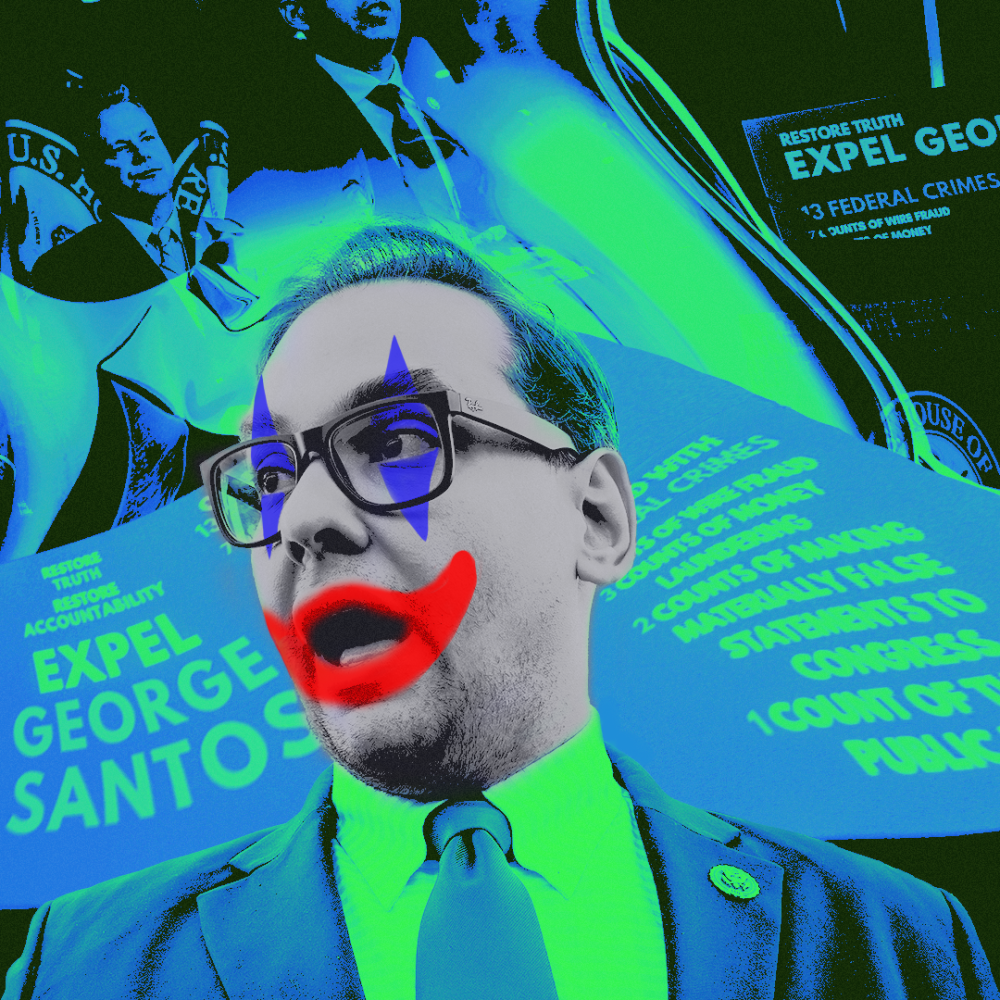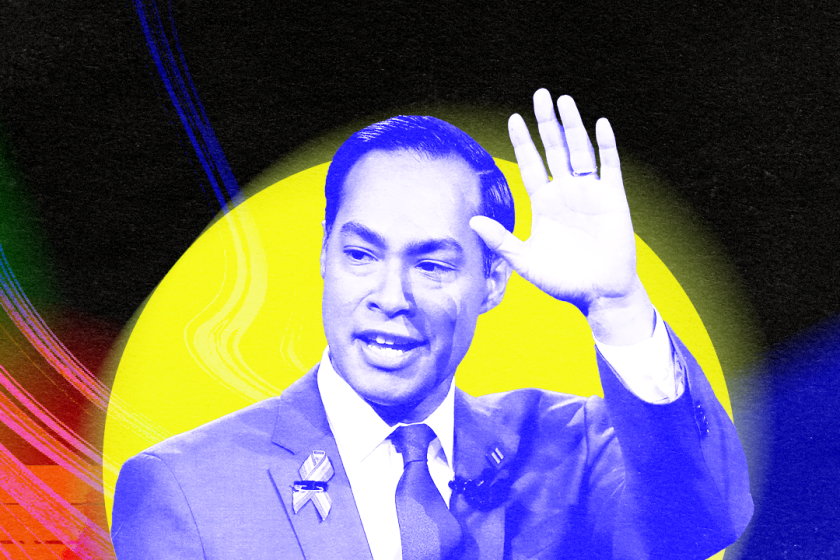
- Share via
There are many kinds of drag queens. Some are aesthetes, devotees of beauty and fashion. Others, my favorites, are social commentators. They critique the status quo by embodying an exaggerated version of it. These people are clowns, jesters, fools in the medieval sense. Their job is to hold a mirror to our wicked world and expose its artifice, to mock what we accept as mundane, to remind us that we, too, are mere actors on a stage.
We’re not allowed to be upset with them over it either, because they have placed themselves beyond the sovereign of taboo, have exempted themselves from accountability by situating themselves in the neutral territory of the absurd.
And like the royal courts of old, we, the audience, find naughty delight in being exposed. It’s a cathartic reminder of the ridiculousness of daily life. That’s what I get out of my favorite drag queens, anyway. This sentiment goes a long way in explaining the fandom, half-ironic, half-sincere, that has sprung up around one disgraced politician who has captured the public imagination in the form of memes and wall-to-wall news coverage as of late. You might have guessed who.
Television can turn the most malignant — or ridiculous — figure into a powerful force in American life. (Just ask Trump.) Let’s not make George Santos a star.
George Santos is not a drag queen. Not anymore. He’s retired his wig and feathered gown (allegedly). Perhaps in an alternate universe where he is 99% less evil, Kitara Ravache, the drag persona, lives on, and George Santos, the congressman, never came to be. Alas, all evidence points to us living in one of the more sadistic offshoots of reality, so here we are.
Drag queen or not, one thing Santos undeniably continues to be is a clown. His truncated run in the House, characterized by a series of cartoonish acts of villainy that would make the Grinch blush, feels like a social experiment gone awry. It nearly registers as performance art.
If we looked at it that way, what would the performance tell us? If George Santos in his upside-down portrayal of a statesman is holding up a mirror, what do we see? And why would anyone find such a heinous example of American moral rot to be, well, a little iconic?
Let us enter the Santos-verse and look for answers.

It’s difficult to know where to begin in summarizing George Santos. It’s even harder to separate fact from fiction. Volleyball star. Latino success story. Broadway producer. Devoted husband. Possible OnlyFans patron. Liar. White-collar criminal. He is reviled. He is celebrated. He is a gay icon to some, and a bigot to others. To look for his true face is a fool’s errand, and even his paparazzi photos seem to always be of some slightly different person, depending on his outfit and the state of his Botox.
The man is an abyss, a labyrinth of mirrors.
Flipping through his Rolodex of crimes, special attention ought to be paid to ones that caused genuine harm. One that sticks out to me is the time he allegedly swindled a mentally ill veteran with a dying dog through a fake GoFundMe campaign. Despite being a gay man, Santos has thrown his support behind anti-LGBTQ policies, such as one Florida law that advocates have derided as a “Don’t Say Gay” law.
Watch “Cowabunga,” the latest Netflix comedy special by Dallas-based comedian Ralph Barbosa, to understand how Latinos think about politics.
With that in mind, I’m going to exercise some moral clarity and say something super brave: George Santos is a bad person. So why, then, are there popular memes about a “Free George Santos” school walkout? How is it that he has inspired sendups on “SNL” and from prominent drag performers? Why, among the generation that has rejected Republicans in droves, has he found such a cult following?
It goes back to clownery, to the absurd. The modern Republican Party is morally bankrupt, having recently tried to overturn the results of a presidential election and continually attempting to subvert the rights of marginalized groups. But it’s not just the GOP. Our democracy is on life support, and corruption runs deep.
Think, for example, of the recent case of Bob Menendez, a senator from New Jersey who stands accused of bribery, among other misdeeds. Most Americans believe that our politicians are acting in self-interest, that our system is broken, that there’s a sickness in our national project. These beliefs are casual, uncontroversial, ordinary. They feel endemic to our daily lives.
The constant weight of these sentiments inspires helplessness, bitterness and tedium. It forces us into constant compromise with lesser evils as we try to mitigate the suffering, to throw our efforts into incremental change between putting out fires.
I’m not a person who believes the two major political parties are morally equivalent, and yet I experience this malaise as well. While shouldering this burden, it feels necessary to seek release.
This is where the bizarre fandom of George Santos springs up.
The foundation is known as the largest network of Latino philanthropists in the U.S., and Castro said he aims to take its efforts nationwide.
His actions echo the everyday evils that take place in Congress but are amplified to such a degree that they register as spectacle. He is a mustache-twirling, funhouse-mirror distortion of a crooked American politician.
One of our oldest national folk tales is that of George Washington and the cherry tree. George was so honest that he was utterly incapable of telling a fib. The story is meant to tell us what makes a good American leader: Honesty. Honesty is the root of integrity, the thing that defines the character of a man. An honest man accepts the consequences of his actions no matter what, even if there is no personal advantage to doing so.
Sure, the George Washington of American mythos doesn’t reflect the true person. But if he did exist, George Santos would be his Wario, his evil opposite. George Santos would have claimed he didn’t even know cherries grew on trees while baking a cherry pie with freshly cut wood in his fireplace. He might even offer you a slice.

Between these two figures, Washington and Santos, which looks more like modern-day America? An America that, in very recent memory, elected a former game show host to the highest office in the land, and might just do so again?
If Santos is a clown, is the country that allowed him into office not the circus? Condemning the person is easy. Interrogating the system that bolstered them is much harder. What makes George Santos so funny as an entity is that he makes tangible the nearly invisible wickedness of our political machine, and it’s a machine that deserves mockery.
Still, there are doubtlessly people who will look at the George Santos memes and say, “Stop this! Stop celebrating an evil person!” But these people misunderstand evil. The point is, our country, our government, and our citizens already celebrate evil. We already participate in it, albeit in forms that seem banal, seem ordinary, seem acceptable to our sensibilities.
How do you compassionately get rid of the things your immigrant parents hold onto that are piling up in their home?
But let us separate the art from the artist here and acknowledge that George Santos is an irredeemable lout and that the spectacle of his actions is undeniably camp.
His bombastic farewell tour has seen him calling out House Republicans as abusers, inside traders and, oddly, as lesbians. He was such a thorn in the GOP’s side that he left them no other choice but to turn on him, and these are people who will excuse a breathtaking variety of sins. As someone who is no fan of the GOP, I must say, it very nearly fills me with gay pride to see another gay Latino gum up the works like this. It feels like we sent a sleeper cell into the Republican Party.
It is with no sadness that I watch him receive his karmic justice, and, indeed, if he never faced it, it would be that much harder to laugh. Good villains defeat themselves. Hopefully, he goes away now, as unlikely as that is to be the case, so that we can make heads and tails of his legacy. And what do I, a Santos-verse scholar, think that should be?
I think his legendary misdeeds should echo through the halls of power for decades. May his Botoxed face haunt the House and mingle with the weeping shades of Washington and Lincoln. Let us erect a physical monument of shame in his likeness and point it toward the Capitol dome as a reminder to the leaders of this country of the capacity of the American public to elect the worst of us. Let it call upon them to seek out the George Santos within their own hearts and expel him. Let them constantly wonder, “Do I deserve this position? Did I earn it honestly? Would I, if given the chance, use my hardworking constituents’ money on Sephora?”
Melissa Barrera showed solidarity with Palestinians. Hollywood showed its persistent double standard
Barrera’s firing is a sad reminder of how historically marginalized groups, like Latinas, are forced to walk a tightrope when advocating for social causes, and of how fragile “representation” is in Hollywood.
And let him remind us all, in his exaggerated turpitude, that there’s some truth buried deep in the wilderness of his many lies, and it doesn’t flatter any of us.
Okay, I actually don’t mean the “physical monument” thing. I was lying. George would be proud.
JP Brammer is a columnist, author, illustrator and content creator based in Brooklyn. He is the author of ”Hola Papi: How to Come Out in a Walmart Parking Lot and Other Life Lessons,” based on his successful advice column. He has written for outlets including the Guardian, NBC News and the Washington Post. He writes a weekly column for De Los.
More to Read
The Latinx experience chronicled
Get the Latinx Files newsletter for stories that capture the multitudes within our communities.
You may occasionally receive promotional content from the Los Angeles Times.











